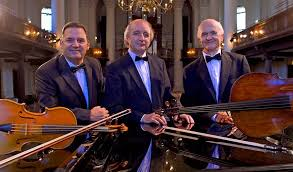Opus Theatre, Saturday 7 December 2019
The London Piano Trio were making their first appearance at the Opus Theatre and chose to err on the side of challenging their audience rather than going for a smooth introduction. This worked extremely well, for while the composers may have been familiar the works themselves were demanding and unexpected in the inter-active response they required from the highly attentive audience.
They opened with Beethoven’s C minor Trio Op1No3. Whereas Haydn had approved of the first two trios in the set he warned the young Beethoven against publishing the third as it might have confused the listener. One can see why. The two central movements flow easily – the Andante cantabile has a delicate beauty with the piano part hinting at much that was to come for the more mature composer. The Minuetto similarly has a florid innocence. It is the outer movements which require greater attention, the brooding opening Allegro is often uncomfortable and in the Finale the key changes seem challenging even for a modern listener.
This was followed by Shostakovich’ E minor Trio Op67, written at a time when the composer was working under extremely difficult conditions in Russia. The high harmonics for the cello in the opening bars are extremely uncomfortable and it would be easy to think the cellist was still tuning. It is eerily disconcerting. If the fire and sparkle of the Allegro is more relaxed it is not without its nervous edge. Only the simplicity of the Largo brings anything like normality – but what is one to make of the final Allegretto? With its Jewish folk music interspersed with moments of real fury it is disconcerting to the point of being almost upsetting, and yet Shostakovich leaves us on the right side of despair.
After the, by that stage very necessary, interval, we were with Shubert and the B flat major Trio D898. If this was distinctly easier on the ear, its late writing meant that there were subtleties within the score which provide darker colours and hints of tension which were potentially at odds with the surface beauty. The wonderful richness of the opening movement gives way to the sublime Andante and the playfulness of the Scherzo. The final Rondo is indulgent in all the right ways and brought the evening to a most satisfactory close.
The most obvious comment about the playing was that one was never aware of any one musician leading, only of the trio playing as a single instrument. This is a tribute to the mature professionalism of violinist, Robert Atchison, cellist, David Jones and pianist, Francis Rayner. We hope they will be back again soon, potentially before the end of this their twentieth anniversary celebrations.

